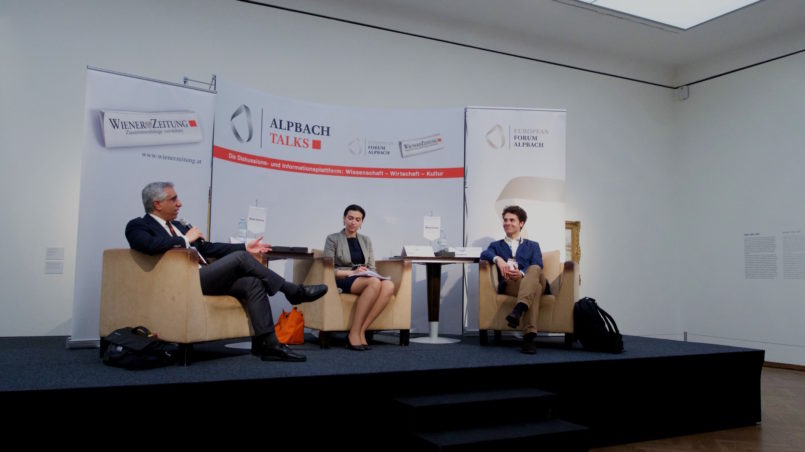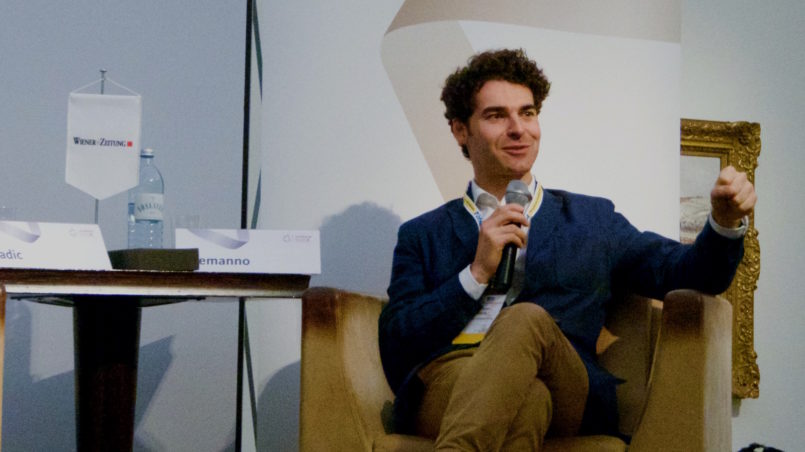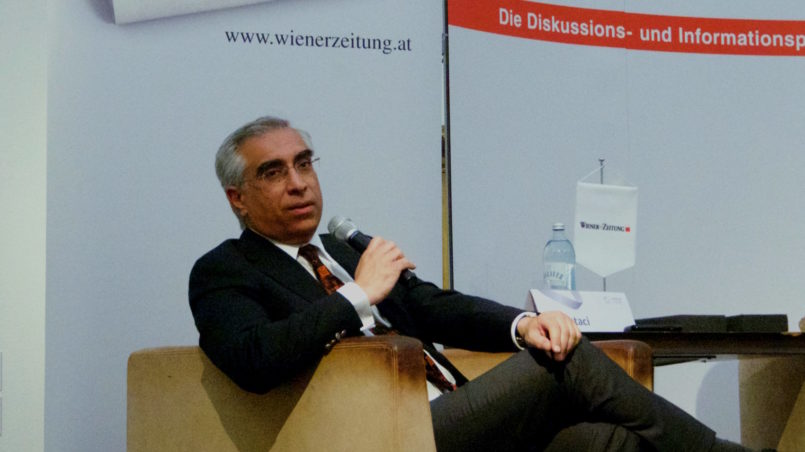Alpbach talks: Civil rights in the digital age

Worse than Orwell’s nightmare
Which means are necessary to make room for citizen participation in the digital age? How can the Internet be regulated, while maintaining the right to privacy? The civil law expert Alberto Alemanno and Joseph A. Cannataci, UN Special Rapporteur on the right to privacy, are discussing on the first fundamental rights forum in Vienna, to get to the bottom of this and other questions, as part of a special edition of the Alpbach Talks.
“What would you say if your government committed citizens to carry a device with them, by which it has access to their data at all times, retrieves their mail traffic and can furthermore trace their every move?” Joseph A. Cannataci , UN special rapporteur on data protection, asks the audience at the first of the Alpbach Talks, stating that they most likely already have one in their very pocket. Except, with our smartphones it is not the government whom we authiorize to sniff in our privacy without obstacles (or at least only partially), but multibillion Internet companies like Facebook, Google and Amazon. “Winston (the main character in George Orwell’s novel “1984”) could at least go to the countryside, where he he was safe from the so-called tele-screens of Big Brother, underneath a tree. Today, even in rural England we are spied on by more cameras, than George Orwell could ever have imagined.”Cannataci paints a bleak picture of the present, which civil rights expert Alberto Alemanno can not really brighten.
“The good lobby” as a builder of bridges
Alemanno recently founded the NGO “The Good Lobby” and explains in conversation with Forum Alpbach host Alma Zadic, what he wants to achieve with his organization: He sees a real David and Goliath battle – NGOs are under-represented and under-staffed in the EU. The big corporations, in contrast, invest incredible amount of money and resources to meet politicians and to gain access to political decision-making processes by means of lobbying. The result is that some interests are better represented than others. Some voices are much louder than the rest. Some are not heard at all.
The “Good Lobby” seeks to ensure that everyone gets a place at the negotiating table. It sees itself as a platform, linking experts with NGOs that are dedicated to environmental protection and other common good purposes. By experts, Alemanno means scientists, specialists and ordinary citizens alike.

Over the next 10 years, the number of students in secondary schools and universities will double, predicts Alemanno, yet at the same time the interest of citizens to participate in political decisions, will continue to decline. A paradoxical situation: the world is indeed becoming more professional, yet no use is made of this expertise. “The Good lobby” wants to place this knowledge – whether in technical matters or legal issues – at the disposal of NGOs and citizens, thus opening a bridge between them and the policy.
Whistleblowers, much hated uncoverers
Also, Alemanno would like to support so called Whistelblowers, meaning people who uncover scandals, with his organization. Whistelblowers frequenty end up under media and professional pressure, which can lead to the destruction of their livelihoods. In addition, Alemanno also wants to work on their image; Whistelblowers are often perceived by the public as traitors and informers, which exposes them to additional strong psychological stress. The goal is for the bearer of bad news to not be stigmatized any longer, but instead those who caused them.
Another important point to Alemanno’s agenda is what he calls Citizens’ Lobbying. Until now, choices to participate in political life, for the most part, were limited to all but two: One can elect, if one even uses this right at all, or one can go for a political office, but there are very high hurdles to overcome. Yet there are many other ways to help shape society. You can contact politicians, start petitions or file lawsuits. “The Good lobby” wants to help, since many inhibitions have to be overcome by citizens.
Data, our gift to billions-worth internet giants
“I often ask my students: Which ones of you believe that Facebook or Twitter are free? Almost all of them raise their hands,” Alemanno relates from his everyday life as a lecturer. “Very few see that we pay for use with our data.” Awareness of this trade is low, even among academics and in the social media generation, or is repressed out of convenience; although Alemanno believes to recognize a change of heart at least in Europe. As a reason for this turnaround in Europe, Alemanno identifies a fundamental cultural gap: For us Europeans, privacy is a right, to Americans it’s a commodity. That makes a huge difference. The Americans give the market full access to data and they seem to have no problem with it. In Europe, privacy is theoretically still a very valuable asset, which is ,however, often neglected for convenience. Still, we speak a different language in this respect.
Protection of privacy yields market shares
At this point, Joseph A. Cannatci takes the word: he sees a chance for better privacy in the encryption of Internet traffic. Governments still bridle against it, but he hopes that common sense will ultimately prevail. Prohibitions will hardly prevent the “bad guys” from continuing to protect their communications channels from prying eyes with ever richer trick encryptions, while ordinary citizens remain at the data collectors’ mercy. In addition, the Internet industry simply creates facts in order to secure their markets. Companies like Apple, Google or Facebook with Whats App, focus more and more on encrypted communications and Internet traffic, because at least in Europe, the subject of privacy is gaining importance. They presumably do not have the interests of users at heart, but rather market share, still in the end that hardly matters, says Cannataci. He cites the case of Apple’s refusal to unlock an iPhone at the request of the FBI.

Governments must not play the citizens’ need for security off against the right to privacy, says Cannataci and calls the authorities to carefully weigh these two goods against each other at any decision. Already, there is 100 times more monitoring than there was at Stasi time and a further erosion of the right to privacy can not guarantee absolute security, Cannataci is convinced. Without exception, all terror bombers of the recent past were known to the authorities, yet still they were not able to prevent the attacks and even the most gapless monitoring can’t help against mentally disturbed individual perpetrators. One hundred percent security can not exist, says Cannataci. Privacy, in contrast, helps every individual to become the person they want to be, without being hampered by self-censorship and numbing in their development.
The internet’s development is still in its baby shoes
The development of the Internet reminds him of the development of cars, says Cannataci. With cars, the initial focus was primarily on the speed, the rest did not matter – only gradually safety was considered. With the Internet, the situation is similar; The development is at its beginning and much will have to be invested in security and the establishment of legal and technical standards.
Alberto Alemanno confirms Cannatacis’ view and compares the increasing security awareness of Internet users to smoking: A formerly accepted behavior becomes increasingly ostracized because awareness has been created. The awareness of privacy on the Internet will develop in much the same way, he is convinced.
Digital citizen’s participation is hardly accepted
Finally, Alemanno focuses on the possibilities of digital citizenship and states that in the review of digital tools, disenchantment has spread after the initial euphoria. As an example, he cites what he considers to be one of the most important achievements in this area: An upload function for organizations that wish to provide the European Commission with statements, without having to take the formerly complicated way by mail or personal appearance. This, and other tools for citizen participation, are however hardly accepted. (Which does not surprise me, because even after an intensive search on the net I could not find the mentioned page.) In order to achieve more popularity here, one must be guided by the big social media portals like Facebook and Twitter and develop civic software which invites to participate.

Alberto Alemanno (born in 1975 in Italy) is a professor of European law in Paris and describes himself as a citizen-lobbyists. Since 2003 he has been advising the European Commission on the TTIP negotiations.
Joseph Cannataci is UN Special Rapporteur on data protection. He studied law at the Universities of Malta and Oslo. Later he qualified as a Chartered Information Technology Professional in the UK and received the title of Chartered Fellowship of the British Computer Society. His doctorate in law, he acquired in 1986, with a thesis on privacy and data protection law. Throughout his career he was called, among other things, as a professor at the Universities of Groningen, Malta, Perth and Farmville.
Translation from German: Serena Nebo



